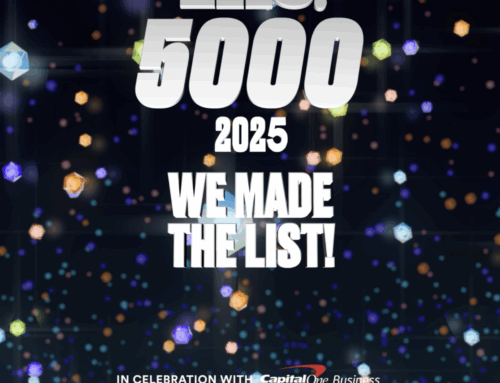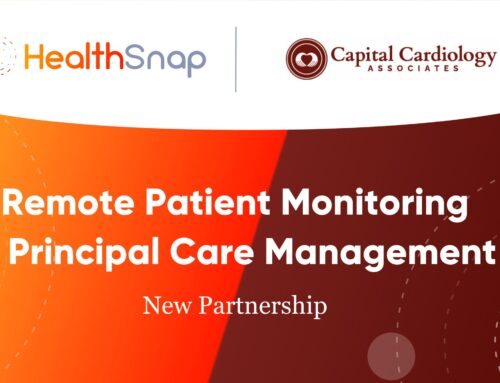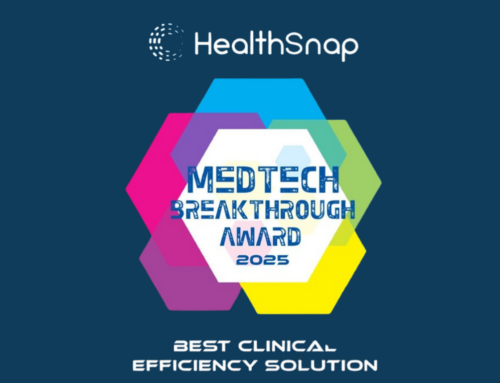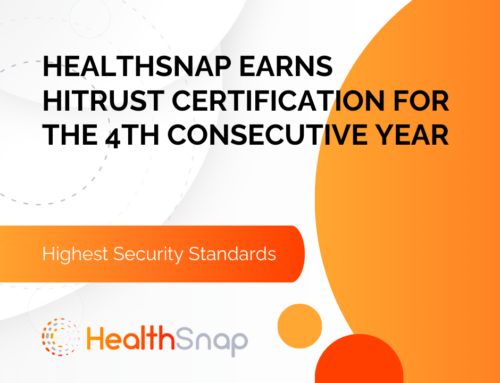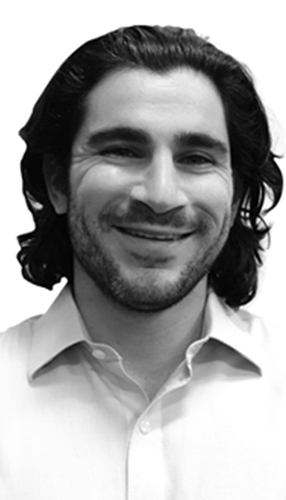By Wesley Smith, Ph.D., HealthSnap Co-Founder & Chief Scientific Officer
There is a major risk factor for cardiovascular events that often goes unmentioned. It also dramatically lowers the quality of life and accelerates cognitive decline. This often overlooked risk factor can increase overall mortality risk similar to smoking 15 cigarettes per day—it’s an epidemic. Many times, you can’t even see the patients affected by it.
This often overlooked risk factor can increase overall mortality risk similar to smoking 15 cigarettes per day—and it’s an epidemic.
I saw it firsthand during my time working in a geriatric hospital. One of my favorite patients, “Dorothy” (a name I’ll use for her), was always smiling, laughing, and telling great stories. However, on the day she forgot her appointment, I went to find her in her room. From outside the door, I heard uncontrollable, relentless sobbing. It was Dorothy, and she had no idea I could hear her. When I knocked and asked to speak with her, she came to the door, smiling and acting as if nothing had happened. Over the next few weeks, we became close enough that Dorothy finally confided in me—unaware that I had heard her crying—that she was so lonely and that it was devastating for her at times. She then opened up to discussing this more with our counselors and psychiatrists and eventually said that her connection to us made all the difference.
What Dorothy was suffering from was loneliness, an epidemic that is physically dangerous and mentally debilitating, and it’s frighteningly common among seniors. But what’s exciting is that the evolving landscape of healthcare, through the use of technology and remote interactions with patients, allows them to feel closer to their care team. It instills a continuity of care with a “Care Navigator,” as we call them at HealthSnap, who essentially becomes their healthcare confidant. This is where digital healthcare can make a significant difference, and “Dorothy” would have benefited significantly.
What Dorothy was suffering from was loneliness, an epidemic that is physically dangerous and mentally debilitating, and it’s frighteningly common among seniors.
Reconnecting Patients with Their Providers to Combat Loneliness
Feeling lonely socially is hard, but being lonely when it comes to the people responsible for your health and well-being is directly linked to negative health outcomes. Evidence shows that traditional healthcare often struggles to maintain continuity of care with patients, leading to feelings of disconnection from their providers. Patients may receive only occasional visits a few times per year in busy practices where providers have just a few minutes to spare. In fact, when you strip away the administrative tasks and updates to medical records within the traditional 15-20 minute primary care visit, doctors spend about 5 to 7 minutes directly engaging in health-related conversations with their patients during these visits. There are so many Dorothys out there that we don’t know about.

Many patients feel lonely and disconnected from their healthcare providers due to systemic issues in the current healthcare system. While physician assistants (PAs) and nurse practitioners (NPs) play vital roles in addressing provider shortages, seeing multiple providers can compromise a patient’s sense of continuity and connection. Additionally, patients commonly encounter issues with care coordination, such as poor communication of test results and inadequate record sharing. The evidence underscores that fostering a closer, more continuous relationship between patients and their healthcare providers can be an important strategy to improve health outcomes. This is where having a healthcare “confidant,” or care navigator, who reduces fragmentation, coordinates care, and maintains regular communication, can make a meaningful difference. Furthermore, digital healthcare, through remote care coordination and patient monitoring, has the potential to restore a sense of security among patients, rekindle their connection to providers, and combat loneliness by building trust and offering consistent guidance throughout their care plan journey.
This is where having a healthcare “confidant,” or care navigator, who reduces fragmentation, coordinates care, and maintains regular communication, can make a meaningful difference.
The Legacy of Hippocrates: Connecting with Patients Beyond Symptoms
The importance of providers establishing a strong bond and maintaining regular communication with patients dates back to ancient Greece over 2,000 years ago. Hippocrates, often referred to as the “Father of Medicine,” was renowned for his compassionate approach to medicine, which emphasized understanding patients’ lifestyles, diets, and environments.
Hippocrates believed that effective healthcare required knowing the patient as a whole person. One of his notable teachings stressed that it is more important to know what sort of person has a disease than to know what sort of disease a person has. This philosophy led him to interact closely with his patients, observing their daily lives and habits.
…know what sort of person has a disease than to know what sort of disease a person has.
Regular communication with patients allowed Hippocrates to gather critical insights into their routines and stress levels. He often recommended lifestyle changes, such as dietary modifications and physical exercise, based on personalized consultations. These holistic recommendations were aimed at preventing illnesses and fostering well-being, making patients feel understood and less alone in their care journey. This emphasis on continuous patient engagement and personalized care highlights the timeless importance of understanding patients beyond their symptoms, demonstrating that building strong, communicative relationships is foundational to effective healthcare.
This emphasis on continuous patient engagement and personalized care highlights the timeless importance of understanding patients beyond their symptoms, demonstrating that building strong, communicative relationships is foundational to effective healthcare.
An Ancient Philosophy Reflected in Modern Remote Healthcare Innovations
This ancient wisdom can be mirrored in modern practices. Just as Hippocrates understood the importance of a personal connection in healthcare, Care Navigators can establish strong bonds with patients through regular communication and evaluation. Regular conversations can help identify needs by adopting digital methods such as telehealth. This new age of healthcare can bridge the gap between patients and providers, leveraging technology to foster closer relationships and improve overall health outcomes; it also enables us to find those countless “Dorothys” out there who need help. Establishing a bond and trust with patients, and understanding them through listening and empathy, are elements of digital care that HealthSnap focuses on—and it seems to be working. For example, in a survey of HealthSnap’s current patients, 95% of respondents reported that the Chronic Care Management and Remote Patient Monitoring programs improved their sense of connection to their provider and enhanced their security regarding their health and well-being.
The essence of caregiving, from ancient times to today, lies in establishing meaningful connections with patients. Even in this thrilling epoch of artificial intelligence and data-centric machine learning algorithms revolutionizing healthcare, the indispensability of human touch persists. Human interactions are deeply anchored in empathy, comprehension, and the capacity to manage intricate emotions—elements that digital solutions cannot entirely replicate. While AI can analyze vast amounts of data and predict health outcomes with remarkable accuracy, it cannot replace the nuanced understanding and emotional support that human caregivers provide.

In today’s fast-paced world, innovative strategies like HealthSnap’s Chronic Care Management (CCM) and Remote Patient Monitoring (RPM) programs strive to recreate this holistic approach. Care Navigators play a pivotal role in these programs, acting as modern-day extensions of Hippocrates’ philosophical healthcare origins. They serve as continuous points of contact for patients, ensuring that care is not just reactive but proactive and personalized. By maintaining regular, empathetic communication, Care Navigators help combat feelings of loneliness and isolation while monitoring for concerning physical and mental signs that need further assessment and treatment. This continuous engagement ensures that patients feel heard, understood, and connected, which is crucial for their overall well-being. Embracing Hippocrates’ ancient wisdom through modern remote healthcare innovations enables us to defeat loneliness among patients and foster a more compassionate and effective healthcare system.
By maintaining regular, empathetic communication, Care Navigators help combat feelings of loneliness and isolation while monitoring for concerning physical and mental signs that need further assessment and treatment.
Defeating Loneliness Through Comprehensive Care Strategies
-
Continuous Monitoring: Patients use devices like blood pressure cuffs and glucose monitors that send data to their care teams in real-time. This allows for early intervention and ongoing management of chronic conditions, significantly reducing feelings of isolation. When concerning data trends are detected, the patient is promptly contacted by their Care Navigator, ensuring they never feel alone in their health journey. Additionally, monthly check-in calls to discuss data and care plans help patients feel connected and supported, as care navigators become familiar with each patient’s unique physiological trends.
-
Personalized Care Plans: Care Navigators disseminate evidence-based, physician-prescribed care plans tailored to each patient’s unique circumstances. These care plans may include recommendations for selecting whole foods, increasing physical activity, improving sleep hygiene, and managing stress. By addressing every aspect of a patient’s well-being, these personalized plans foster a deeper connection between patients and their care teams, combating loneliness and ensuring patients feel cared for on a personal level.
-
Building Trust and Empathy: Regular, empathetic communication from Care Navigators helps build trust and establish meaningful bonds with patients. This continuity of care is crucial in combating feelings of loneliness and isolation. By maintaining consistent contact, Care Navigators ensure that patients feel heard, understood, and genuinely supported in their health journey.
-
Holistic Approach: These programs address not only the physical aspects of health but also consider mental and emotional well-being. Regular check-ins and ongoing support create a comprehensive care framework that mirrors Hippocrates’ holistic emphasis. This approach ensures that patients receive well-rounded care, helping to defeat loneliness and promote a sense of community and connection within the healthcare system.
These modern strategies provide an opportunity for providers to help patients feel more connected to their care team, echoing the timeless principles of compassion and comprehensive care. Through CCM and RPM, HealthSnap continues to foster meaningful patient-provider relationships, ultimately enhancing health outcomes and reducing the epidemic of loneliness. This ensures that countless patients like Dorothy know that they are not alone and that we are here for them.

Conclusion
The heart of effective healthcare lies in understanding and connecting with patients. As we face the modern challenge of loneliness among the elderly, innovative programs like HealthSnap’s Chronic Care Management and Remote Patient Monitoring embody this timeless wisdom.


